Bernie Sanders scores 2nd congressional endorsement the day before Democratic debate
- Share via
By the numbers
Welcome to Trail Guide, your daily host through the wilds of the 2016 presidential campaign. It's Monday, Oct. 12, and this is what we're watching:
- Bernie Sanders ' rise and Hillary Rodham Clinton 's struggles usher in a new phase of the Democratic campaign
- But Clinton still holds a commanding lead in two key states -- Nevada and South Carolina
- Meanwhile, Sanders has scored his second congressional endorsement
- 1 in 5 Republican voters say they won't support Donald Trump if he wins the nomination
- Gear up for Tuesday’s Democratic debate by comparing Clinton with Sanders and others
Clinton backs union workers picketing Trump hotel
Hillary Rodham Clinton made a brief appearance with picketers Monday at the Trump International Hotel in Las Vegas, supporting a powerful local union while criticizing Donald Trump's rhetoric about immigrants.
"You have to say no to efforts that prevent you from organizing, to prevent you from having the kind of working conditions you deserve," Clinton told several hundred members of Culinary Union Local 226 gathered outside the hotel. "That means saying no to Donald Trump."
Clinton, the front-runner for the Democratic presidential nomination, said that while supporters of the billionaire businessman see him as entertaining, "I don't think it's entertaining when somebody insults immigrants, insults women."
Nevada culinary union members protest outside Trump Hotel
New Hampshire forum has candidates touting bipartisanship
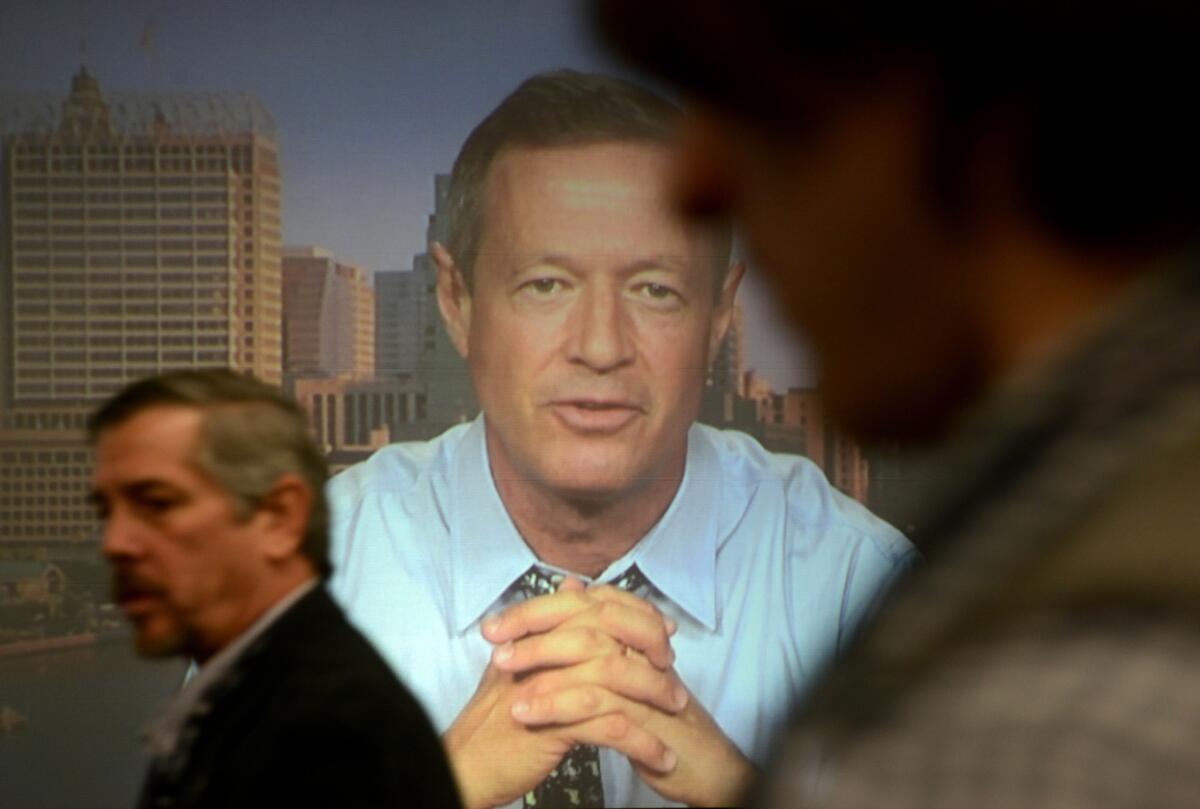
Democratic presidential hopeful Martin O’Malley speaks via Live Stream at the No Labels Problem Solver convention in Manchester, N.H.
They came for the Bernie and Donald show. They left at least thinking about Martin and Lindsey.
"He was put in the category of, 'This guy we'll ignore,'" Richard Pennington of Peterborough, N.H., said of former Maryland Gov. Martin O'Malley. But after seeing him Monday at the No Labels "Problem Solver Convention," Pennington, a Bernie Sanders voter, said he'd give O'Malley a second look.
"He doesn't have any traction. But he's an impressive guy," he said.
Pennington and his wife, Patrice -- respectively a so-called undeclared voter and a registered Democrat -- were among nearly 2,000 people who attended a bipartisan political forum in the nation's first primary state organized by No Labels, a group that's seeking to shift the political discussion away from partisan extremes toward consensus.
Sanders wins second congressional endorsement
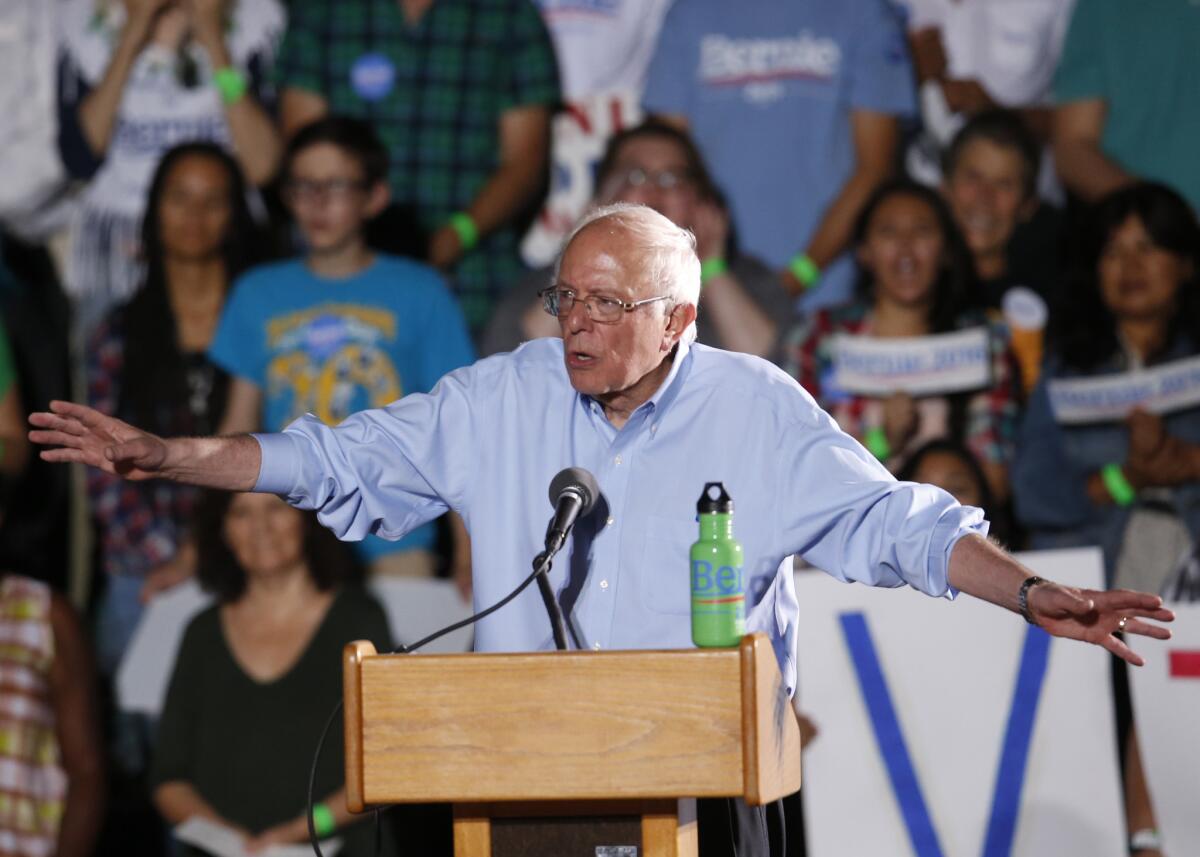
Speaking at a Tucson rally, Democratic presidential hopeful Bernie Sanders called for stiffer gun controls and improved mental health services to address the country’s spate of gun violence.
Sen. Bernie Sanders of Vermont scored his second congressional endorsement Monday, winning over Rep. Keith Ellison (D-Minn.), co-chairman of the Congressional Progressive Caucus.
Ellison's support comes less than one week after Rep. Raul M. Grijalva (D-Ariz.), the caucus' other co-chair, endorsed Sanders for president. Sanders founded the caucus in 1991.
Ellison, the first Muslim elected to Congress, said he endorsed Sanders because the senator focuses on issues important to American families.
"I believe the most important part of his candidacy is that it has the ability to create a renaissance in voter participation, which was at its lowest in decades this past election cycle," Ellison said in a statement distributed by Sanders' campaign. "We've all seen the massive crowds he is attracting, and I think that is a testament to his message connecting with people -- people we will need to turn out in November."
Sanders has drawn crowds from Phoenix to Boston to Tucson but was slow to win the public support from his colleagues on Capitol Hill.
Sanders has gained considerable ground on Hillary Rodham Clinton in some states, particularly New Hampshire, which holds the first primary of the nominating season, but still lags well behind her in many other states and nationally.
He has shown strong appeal to white liberals and an ability to raise large amounts of money from grass-roots supporters, but has less backing among minority voters and moderates.
In a statement Monday afternoon, Sanders called Ellison "one of the great progressive leaders in the country leading the fight for the rights of working families and the environment" and welcomed his support.
"I look forward to working with him to create a government which represents all Americans and not just the billionaires," Sanders said.
CNN has a spare lectern for Biden
Chris Christie calls D.C. debate over House speaker a bore
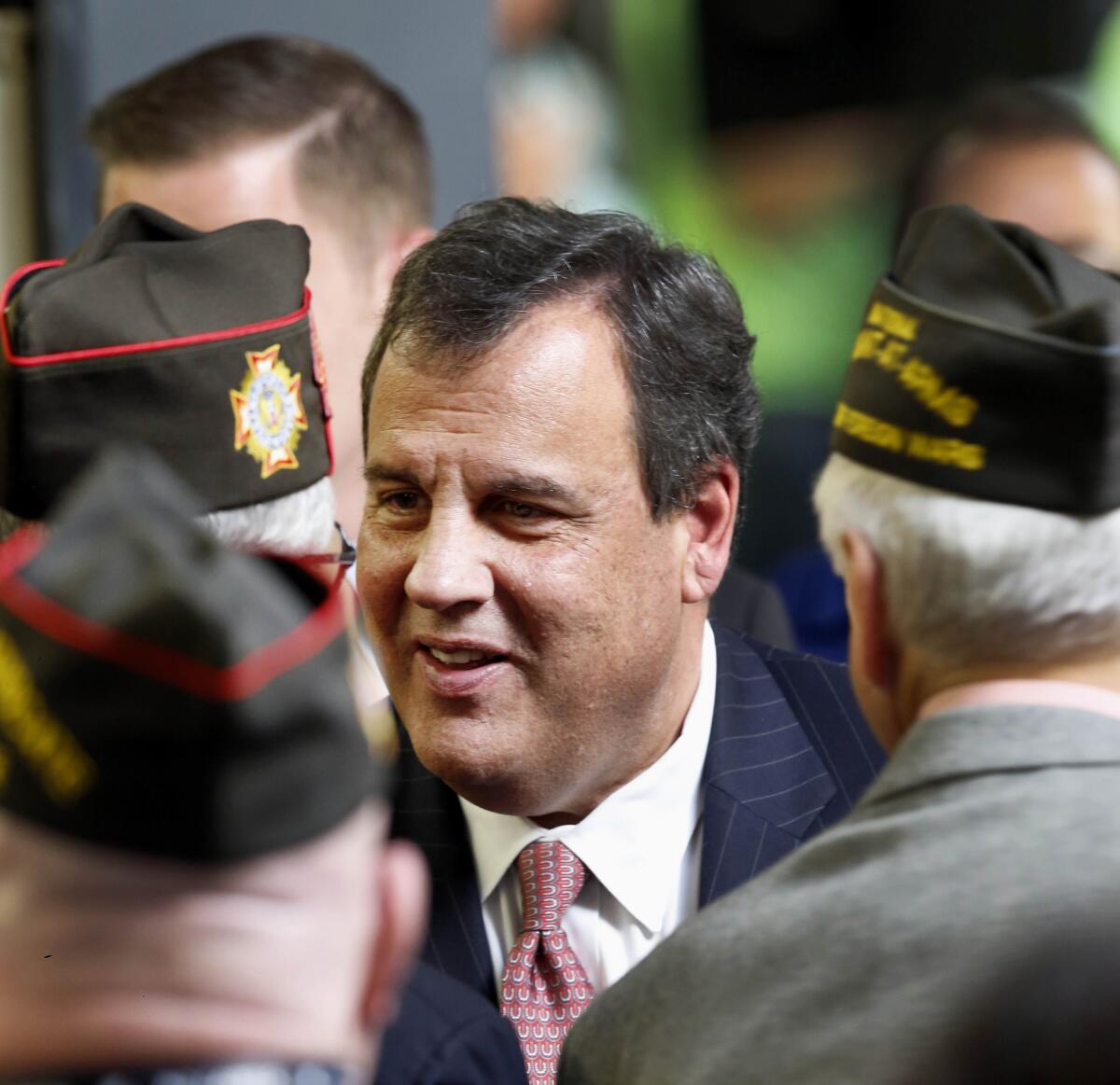
Republican presidential candidate, New Jersey Gov. Chris Christie greets voters after speaking at a No Labels Problem Solver convention, Monday, Oct. 12, 2015, in Manchester, N..H (AP Photo/Jim Cole)
MANCHESTER, N.H. -- Should the president of the United States care who the speaker of the House is?
Chris Christie says he's "bored" with the intrigue in Washington over who should lead Republicans in Congress.
"Who cares? I mean who cares?" Christie said at the No Labels "Problem Solver Convention" in New Hampshire.
"You know what I want and what most of you want? How about they just do something? Just do something rather than all this intrigue in that city where all they want to do is talk about who gets the big office, who gets the big title, and who's able to get the best table at the best restaurant in Washington."
Christie seems to be attempting to make a larger appoint to appeal to the sizable bloc of voters in New Hampshire who aren't registered with either major political party. Independent voters can take part in either primary in New Hampshire, and winning them is a key part of Christie's strategy.
Christie has held more than two dozen town hall meetings in New Hampshire as a declared presidential candidate, and unlike others who addressed the all-day gathering here, he had no opening remarks, launching directly into questions from the audience.
Even as he repeated his view that the speakership doesn't matter, Christie made an implicit argument that whoever holds the office actually matters quite a bit. In response to another question, Christie rejected the idea that the American political system was broken.
"I think it's the people running it that are broken," he said. "This is the same system we've had for a long time that can work. And it can work. But you have to understand that compromise is not capitulation. And right now in Washington, D.C., we have an attitude that says if you are willing to compromise, you are a capitulator. That's not the case."
If Washington ultimately faces another crisis over a government shutdown, Christie said, it would represent "a fundamental failure of leadership."
Trump predicts Democrats' debate will be a snooze
MANCHESTER, N.H. -- Donald Trump says he'll be watching the first Democratic presidential primary debate on Tuesday. He's not sure anyone else will.
"I think it's not going to be very well-rated, because Trump isn't in the debate," he told reporters Monday.
The five Democratic candidates are scheduled to face off for the first time in Las Vegas on Tuesday night. It's the first of six scheduled debates; Republican candidates have already met twice.
Trump predicted most voters would tune in for about 10 or 15 minutes before tuning it out.
"I think it's not going to be a very exciting debate," he said. "You have three [candidates] that have registered very low."
Besides the fact that Trump won't be there, there's another factor competing for at least some voters' attention Tuesday night: the fourth game of the Dodgers-Mets playoff series.
Martin O'Malley goes wonk at bipartisan summit
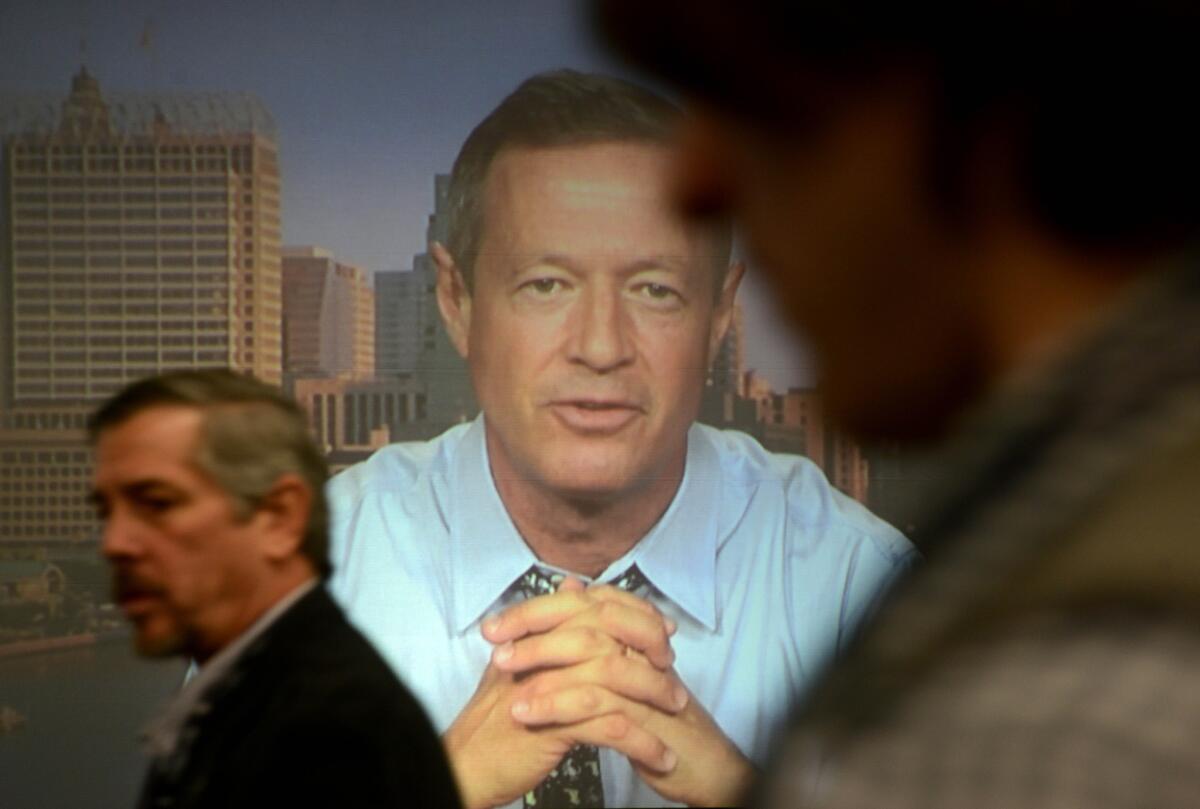
MANCHESTER, NH - OCTOBER 12: Democratic Presidential candidate Martin O’Malley speaks via Live Stream at the No Labels Problem Solver convention October 12, 2015 in Manchester, New Hampshire. Eight presidential candidates addressed the bipartisan event which included many undecided New Hampshire voters. (Photo by Darren McCollester/Getty Images) ** OUTS - ELSENT, FPG, CM - OUTS * NM, PH, VA if sourced by CT, LA or MoD **
Martin O'Malley has assiduously courted the progressive left during his longshot bid for the Democratic presidential nomination, without making much headway yet. But as he addressed a convention geared toward New Hampshire's independent voters, the former Maryland governor and Baltimore mayor seemed at ease highlighting what he said was his nonpartisan approach to governing.
"The nature of leadership has changed in the information age. The place for the leader to be now is in the center," O'Malley said at the No Labels Problem Solver Convention, contrasting it with what he said had been a top-down approach. "That's the way that I've always governed."
O'Malley did make a contrast with his rivals, saying his approach was generational. Hillary Rodham Clinton and Bernie Sanders are 15 and 22 years older than the 52-year-
old.
One of the trademarks of the O'Malley mayoral and gubernatorial administrations was an obsessively data-driven approach to issues like crime. He said the proposals he's offered in his presidential campaign would also be guided by specific metrics and deadlines.
"We need to take actions and have the guts to show people that the things that we're doing are actually working," he said.
O'Malley is the first of eight presidential candidates addressing the No Labels event in New Hampshire's largest city, though he appeared via satellite from Baltimore as he prepares to travel to Las Vegas for the first Democratic primary debate. Sanders and former Virginia Sen. Jim Webb will also address the event through video stream. Republicans Lindsey Graham, Donald Trump, Chris Christie and George Pataki are set to appear in person.
Clinton holds large lead in Nevada, South Carolina in CNN poll
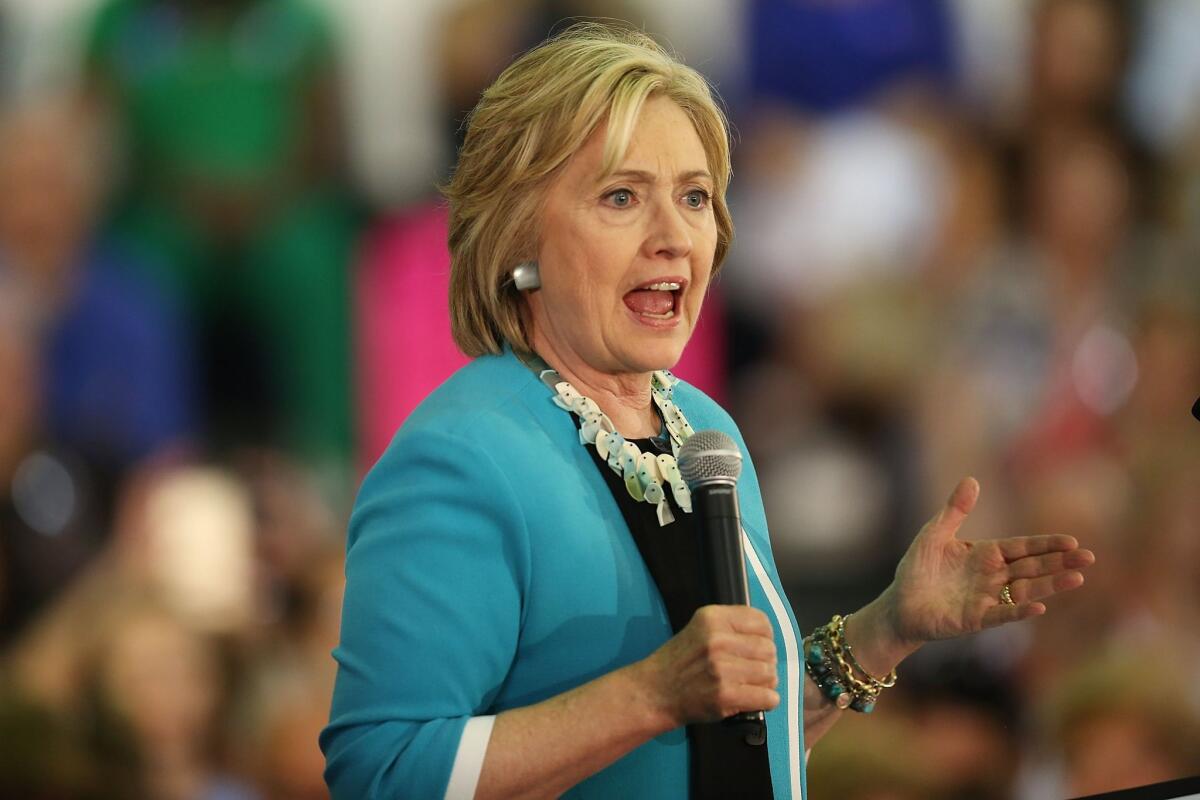
Hillary Rodham Clinton campaigns in Florida.
Here's the conundrum at the heart of the Democratic race: Sen. Bernie Sanders is giving Hillary Rodham Clinton a real run in the first two contests, in Iowa and New Hampshire, but can he go beyond that?
The latest evidence, from a new set of CNN polls of the two contests that follow Iowa and New Hampshire, suggests the answer is no, at least for now.
In a head-to-head matchup, Clinton would beat Sanders 70%-20% in South Carolina and 58%-36% in Nevada, the polls indicate.
If Vice President Joe Biden were to enter the race, Clinton's margin would narrow, but she would still take 50% of the vote in South Carolina and 49% in Nevada in a multi-candidate race.
Why are those states important and why do they look different from the first two contests? Minority voters.
New Hampshire and Iowa have overwhelmingly white electorates, and Sanders has proved to have strong appeal to college-educated white liberals. But in most of the country, white liberals are a minority of Democrats.
Moderates and minority voters form the majority of Democrats in most places, and Clinton beats Sanders handily among those groups.
Sanders could expand his appeal. But so far, as these latest polls indicate, he hasn't.
Here comes a new phase of the Democratic race
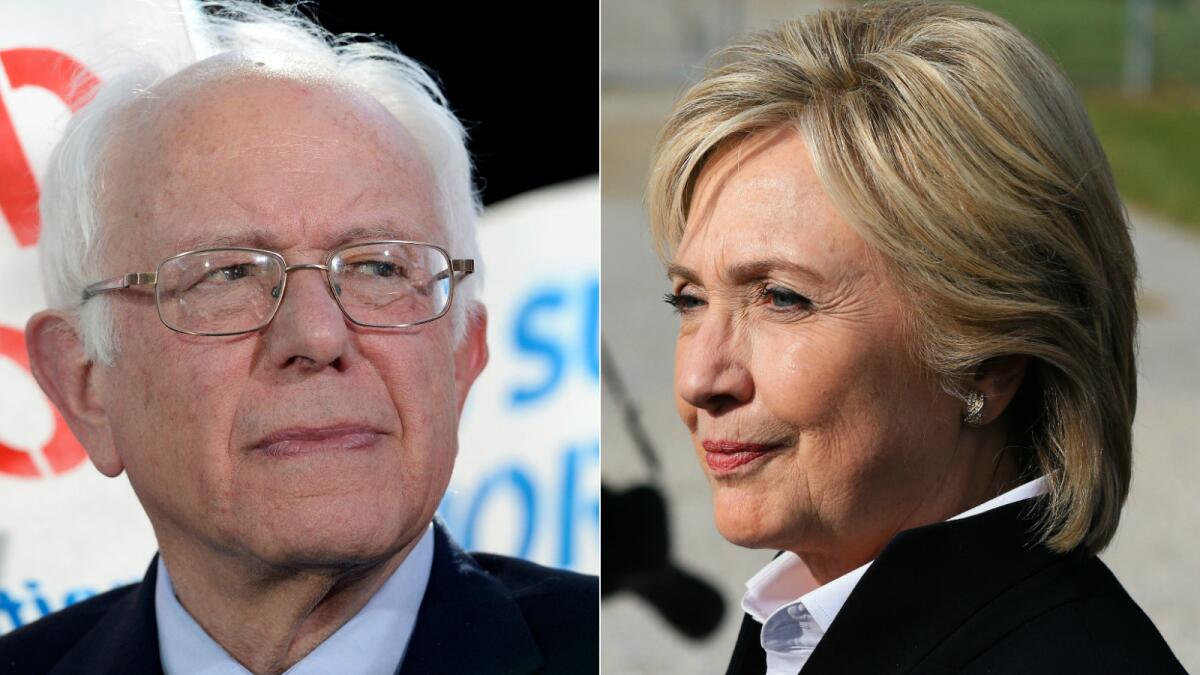
Hillary Rodham Clinton was never going to waltz to the Democratic presidential nomination. No one, however, expected Bernie Sanders, a 74-year-old senator from tiny Vermont to emerge at this point as her strongest challenger.
But Sanders' rise and Clinton's struggle with controversies over her family's philanthropic foundation and the use of a private email server as secretary of State have seeded deep doubts about the front-runner and raised questions about both her political durability and personal veracity.
That has encouraged Vice President Joe Biden to seriously weigh a lightning entry into the race, a move that would instantly transform the contest from a race to catch Clinton -- pitting Sanders against former Maryland Gov. Martin O'Malley and the also-rans Lincoln Chafee and Jim Webb -- into a brawl between the party's two top heavyweights.
Many Democrats, perhaps envious of the boisterous GOP contest, are hankering for a fight.
By the numbers
Get the L.A. Times Politics newsletter
Deeply reported insights into legislation, politics and policy from Sacramento, Washington and beyond. In your inbox twice per week.
You may occasionally receive promotional content from the Los Angeles Times.







